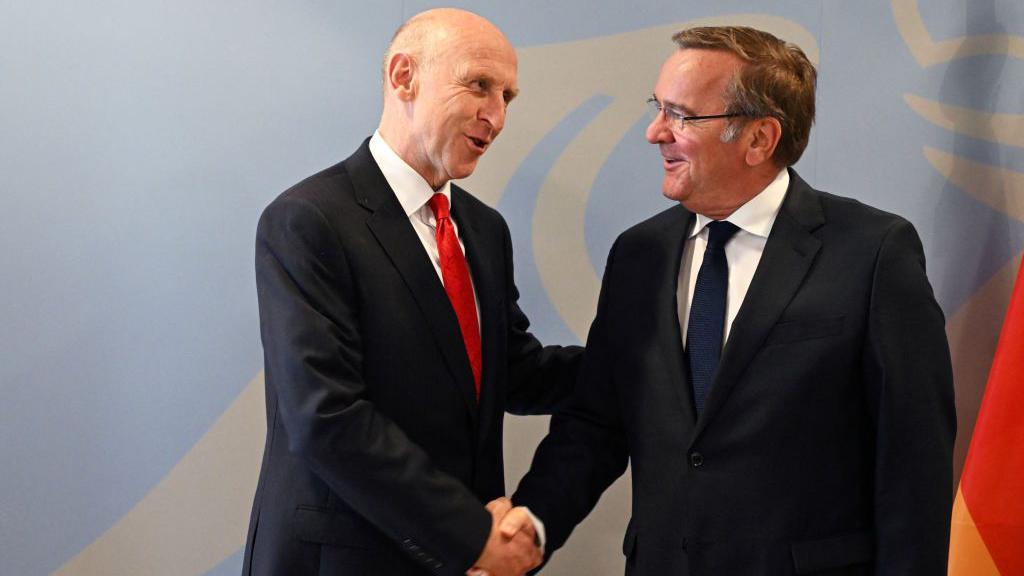UK and Germany Forge Historic Defence Partnership
3 min read
UK Defence Secretary John Healey and his German counterpart Boris Pistorius in July

UK Defence Secretary John Healey and his German counterpart Boris Pistorius in July
The United Kingdom and Germany are set to sign a pivotal defence treaty, hailed by the UK government as a significant step towards enhancing security, boosting investment, and creating jobs. This agreement underscores a renewed commitment to military collaboration following the UK’s departure from the European Union.
Central to the treaty is the establishment of a new factory in the UK by the German defence firm Rheinmetall, which will focus on manufacturing artillery gun barrels. This initiative is expected to create around 400 jobs, marking a significant investment in British manufacturing capabilities. The factory will utilize British steel sourced from Sheffield Forgemasters, a company recently acquired by the UK Government.
In addition to the new factory, the UK and Germany will collaborate on the development of a cutting-edge long-range missile and advanced drone technology. These new systems are intended to enhance military precision and extend operational reach, aiming to surpass the capabilities of current missile systems like the UK’s Storm Shadow and Germany’s Taurus. While the UK has been supportive of supplying Ukraine with military resources, Germany has been more reserved, particularly regarding the Taurus cruise missile.
As part of the partnership, German P8 maritime surveillance aircraft will also conduct patrols over the North Atlantic from RAF Lossiemouth in Scotland. This initiative aligns with similar operations carried out by other NATO allies over the years, reinforcing collective security in the region.
The agreement comes as Labour, during its time in opposition, advocated for stronger military ties with Germany. This initiative is part of a broader strategy by the current UK government to re-establish and strengthen relationships with key European allies post-Brexit. While the UK has an existing defence pact with France—known as the Lancaster House Treaty, signed in 2010—this treaty with Germany marks a new chapter in European defence cooperation.
Both the UK and Germany are the largest defence spenders in Europe and are among the top contributors to military aid for Ukraine. Defence Secretary John Healey characterized the treaty as a “milestone moment,” highlighting its role in aligning the militaries and defence industries of the two nations more closely. Although both countries already cooperate extensively as NATO members, this treaty formalizes and expands their joint efforts.
The partnership also includes a commitment to enhance NATO’s eastern flank, where both nations have deployed hundreds of troops to the Baltic states as part of NATO’s enhanced defensive measures in response to Russia’s actions in Ukraine. Germany’s Defence Minister, Boris Pistorius, emphasized that the treaty would strengthen both Europe and NATO, stressing the need for vigilance in maintaining security across the continent. He noted that the projects initiated under this agreement will be open to other partners, inviting broader collaboration.
The agreement is not merely a symbolic gesture; it represents a strategic alignment that will influence European defence capabilities in the coming years. The establishment of the new factory and the development of advanced military technologies signify a commitment to self-sufficiency and innovation in defence.
As both countries work towards finalizing the details of the agreement, anticipation builds around the potential benefits it will bring. The first artillery gun barrels from the new factory are expected to begin production in 2027, marking a significant return for the UK to artillery manufacturing, a field it had largely moved away from over the past decade.
In summary, the UK and Germany’s landmark defence treaty signifies a renewed commitment to collaboration in military technology and operations. With a focus on creating jobs, enhancing security, and fostering economic growth, this agreement lays the groundwork for a stronger, more integrated European defence strategy in a time of geopolitical uncertainty.